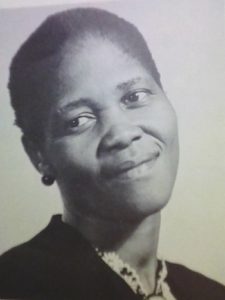
Lilian Ngoyi
*Lilian Ngoyi was born on this date in 1911. She was a Black machinist, nurse, and South African activist.
Lilian Masediba Matabane was born in Pretoria, South Africa. She was the only daughter of Annie and Isaac Matabane and a sister to three brothers, Lawrence, George, and Percy. Her grandfather, on her mother's side, was a member of the royal Mphahlele household who became a Methodist evangelist. Her mother worked as a washerwoman, and her father was a mineworker.
She attended Kilnerton Primary School until Standard Two. In 1928, she moved to Johannesburg to train as a nurse at City Deep Mine Hospital. During this time, she met and married a van driver, John Gerard Ngoyi, in 1934. They had a daughter, Edith, but her husband died in a motor car accident in 1937. Afterward, she became a seamstress, working from home and in garment factories. From the 1950s onwards, she lived in Orlando, Soweto, with her mother and children.
Having been drawn into politics via her work in the Garment Workers' Union of South Africa in the 1940s, Ngoyi joined the ANC Women's League in 1952. She was a widow with children and an elderly mother to support and worked as a seamstress. In 1954, she helped to create the Federation of South African Women (FEDSAW) and was elected to the national executive of the African National Congress; she was the first woman to be elected to national office in the organization. A year later, she became President of the Women's League.
In August 1956, Ngoyi led a women's march along with Albertina Sisulu and others of 20,000 women to the Union Buildings of Pretoria in protest of the apartheid government's passed laws. Ngoyi was also transnational, recognizing the potential influence that international support could have on the struggle against Apartheid and the emancipation of black women. She had, in 1955, traveled on an illegal journey to Lausanne, Switzerland, to participate in the World Congress of Mothers held by the Women's International Democratic Federation (WIDF).
Accompanied by her fellow activist Dora Tamana, she stowed away on a boat leaving Cape Town under "white names," segregated seating on a plane to London. She gained entry to Britain under the pretext of completing her course in Bible studies. She would visit England, Germany, Switzerland, Romania, China, and Russia, meeting women leaders engaged in left-wing politics, before returning to South Africa a wanted woman.
Ngoyi spent a total of 15 years living under three five-year banning orders. This included being confined to her home, and banning orders included being forbidden to attend public gatherings, make speeches, or be quoted; even at her own home, she was not permitted to be with more than one person simultaneously. The first two banning orders were imposed in 1962 and 1967, and when the second order expired in 1972, she could meet colleagues and friends again and travel to Durban and Cape Town. In 1975, another banning order was imposed, which allowed her some communication with the outside world. Lilian Ngoyi died on March 13, 1980.
Memorials and Honors
The Koos Beukes Clinic at the Chris Hani Baragwanath Hospital in Soweto has been renamed Lilian Ngoyi Community Clinic in her honor. In 2009, a residence hall at Rhodes University was renamed in her honor. In 2014, Bree Street in Johannesburg was renamed after her.